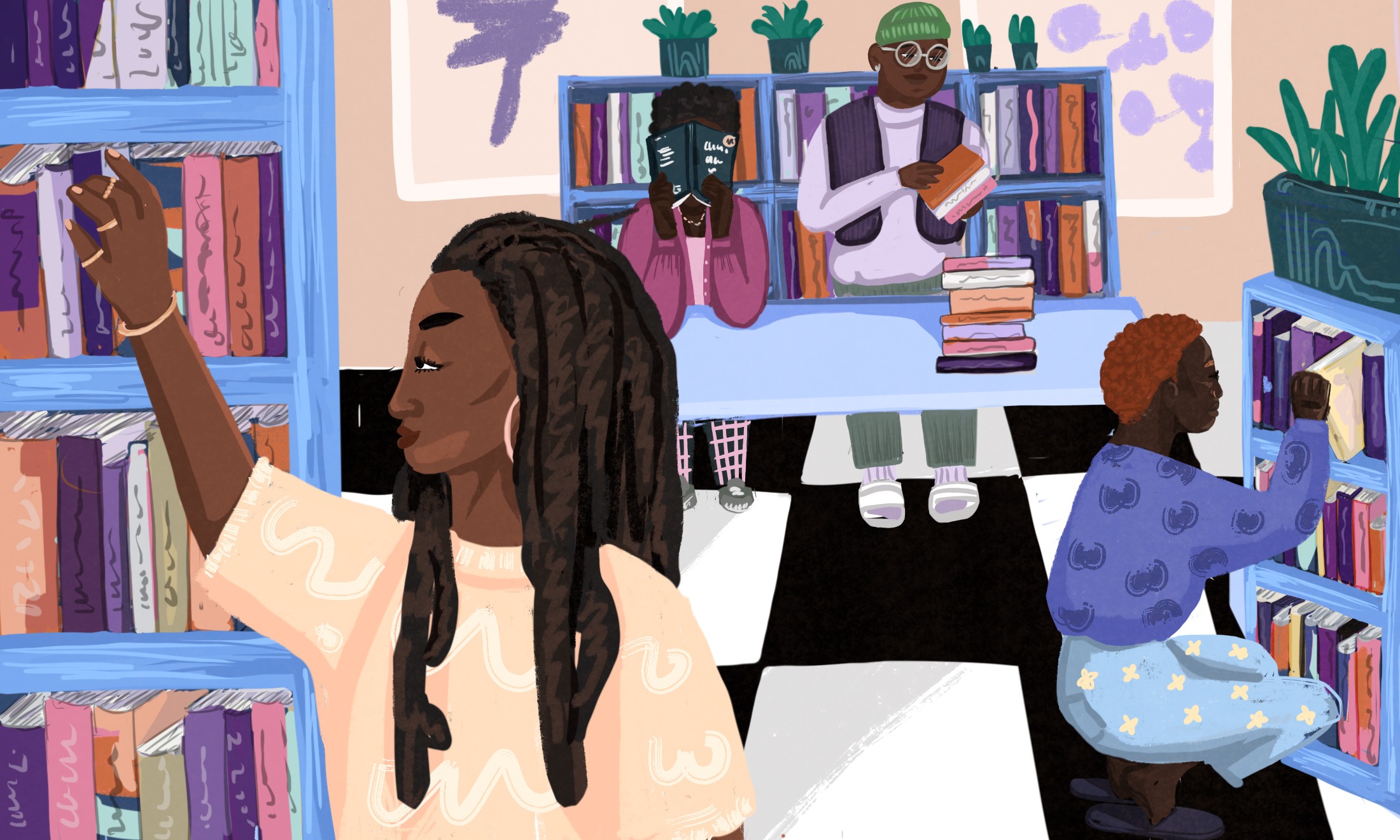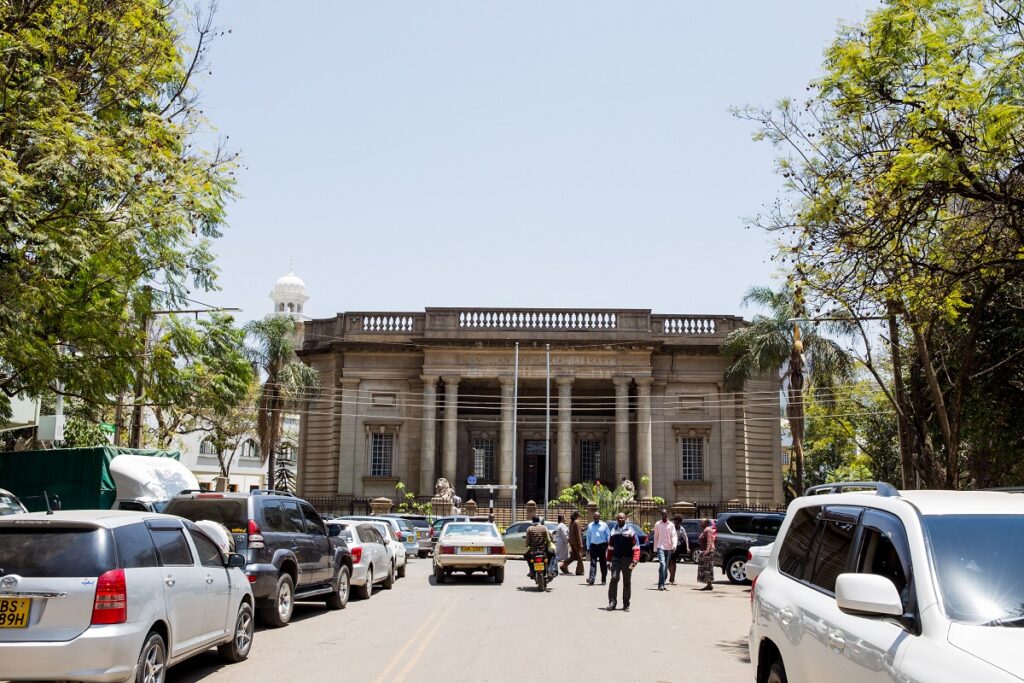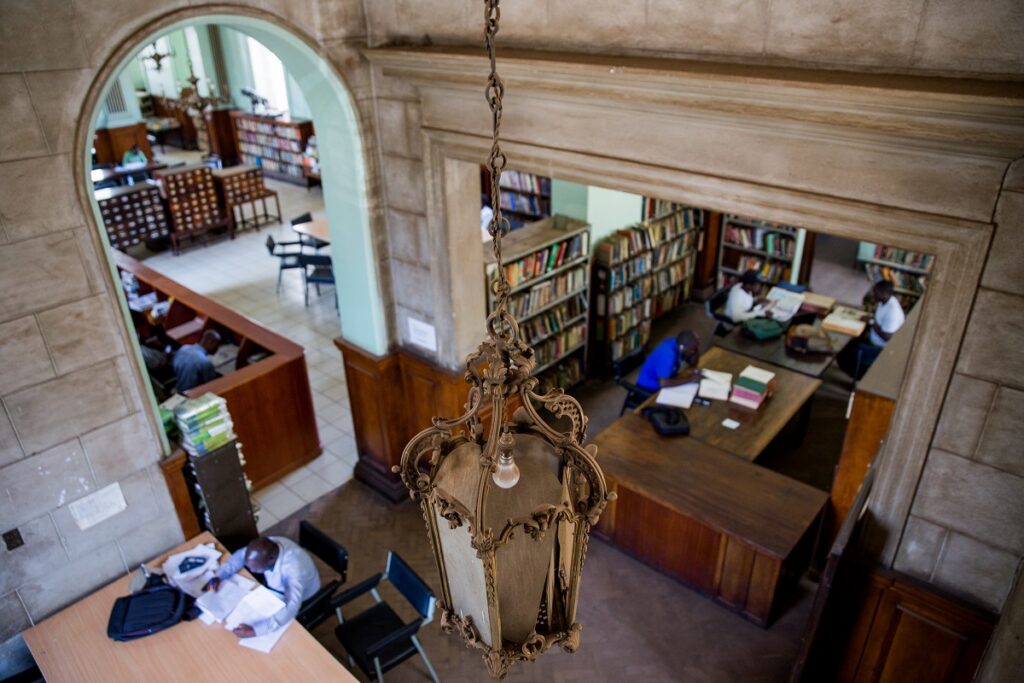
Tinuke Fagborun
Nairobi’s formerly ‘white-only’ libraries are now the centre of Kenya’s literary renaissance
How a group of Nairobi citizens are working to bring the city’s oldest library back to life, and back to those who need it most.
Michelle Chepchumba
18 Nov 2021
In 2017, Too Early For Birds, a theatre production, took Nairobi’s arts scene by storm with their second performance – a series of intricately woven, masterfully told narratives that took the audience on a journey through Kenya’s little-known histories. Among the tales was the story of Sir Northrup McMillan, an imposing settler who, upon his death, was memorialised by his wife, Lady Lucy McMillan, in the form of the equally imposing McMillan Memorial Library that now sits right at the heart of Nairobi’s bustle.
The story exposed a gap. Despite its unmissable size and location, the way it can’t help looking like part of a black-and-white photograph of an older, whiter Nairobi, and a history that includes a drunken former US president, the library (known as the McMillan) was missing a place in our knowledge of the city. Many of us in the audience who entered the education system in the early 2000s had lived our whole lives in the country’s capital, but had never been inside McMillan, and never even knew it was a library.
Having opened its doors in 1931, McMillan is the oldest library in Nairobi, turning 90 years old this year. But its walls were intended to exclude: for the first thirty years of its existence, only the white population in colonial Kenya could go in. After independence, as a wave of Africanisation swept through the country, McMillan finally made space in its colossal halls for black people.
“The McMillan Memorial Library’s walls were intended to exclude: for the first thirty years of its existence, only the white population in colonial Kenya could go in”
However, as Nairobi transformed into East Africa’s commercial and cultural hub and one of the largest cities in Africa, McMillan was left behind. Eventually, it stood desolate and decrepit, abandoned by governments whose ideas of development did not include social infrastructure, and kept that way by various online commentary that Kenya was simply not a reading nation.
The first Nairobi Literary Festival
In a piece about McMillan in 2012, writer Wanjiru Koinange asked, “Did we really go from queuing down the street to enter McMillan, to being described as a nation that doesn’t read?” Thus began her career as a restorer of libraries, and she and fellow literary curator Angela Wachuka founded Book Bunk, a social impact organisation established to put McMillan back together, along with its two branches in Kaloleni and Makadara neighbourhoods in Nairobi.
Earlier this year, Book Bunk completed the renovation of the Kaloleni and Eastlands (Makadara) branches, and in early October, they held the inaugural Nairobi Literary Festival – NBO Litfest – inviting the city’s literary community to beckon a Nairobi where McMillan sat not just at the centre of the city, unseen and stuck in a colonial past, but at the centre of our collective memory and imagination.
The first literary festival in the country since 2019, the NBO Litfest took place virtually from 7-9 October, with a total audience of 835 people tuning in from different parts of the globe, including Kenya, Tanzania, Namibia, Nigeria, and further afield from the US, and the UK. The festival sessions included pre-recorded or live discussions on history, literature, and social infrastructure, interspersed with showcases of Nairobi’s musical and theatrical talent.
Angela Wachuka notes that curating the festival was a full-circle moment for Book Bunk, as a search for a public library to host a literary festival is what led them to McMillan in the first place many years ago. Responses from local communities indicated a demand for libraries to act as centres of public art, inspiring the Book Bunk team. “The Litfest was a natural curation in this direction, serving as a commemoration of the McMillan Memorial Library’s 90th anniversary as well,” she says.
An exciting, and growing, literary ecosystem
The festival joins predecessors such as the Storymoja Festival and the Macondo Festival in ushering in a revival of the appreciation of home-grown art. Last year saw the launch of two litmags, Lolwe and drr, which celebrate work from across the African continent. The latter, which derives its name from Going Down River Road, a novel by prolific Kenyan author Meja Mwangi, publishes print editions alongside its online editions – a noteworthy achievement in a difficult economy. Lolwe also brings an exciting addition to the space in the form of the Lolwe Classes, which feature acclaimed African authors like Maaza Mengiste, Zukiswa Wanner, and TJ Benson as writing teachers. Both magazines have received enthusiastic reception and now form part of a vibrant expanding literary ecosystem in Kenya comprising other magazines like Jalada Africa and Kikwetu, as well as the platforms creating spaces for readers and writers to thrive, like the AMKA Literature Forum, Writers’ Guild Kenya, and the Nairobi Writing Academy.
The Kenyan literary community has had much to celebrate this year. In June, Troy Onyango, Lolwe’s founder, was shortlisted for the prestigious AKO Caine Prize for African Writing, and Idza Luhumyo won the Short Story Day Africa Prize. The Kenya-based Kendeka Prize for African Literature, which aims to nurture new and existing writers from the African continent and the diaspora, was launched early in the year, and in September, so was the Kenyan Readathon – an annual month-long venture during which Kenyans are encouraged to buy, read, and discuss Kenyan writing.
The Readathon’s founder, Lexa Lubanga, believes in the power of similar initiatives to create a trust between writers and readers that will encourage more publishing. “They help writers gauge the audience. It lets them know that because there are readers, this is a safe environment to publish in,” she says.
Her words concur with the growing popularity of self-publishing among Kenyan writers whose target audience is adults. Authors such as Charles Chanchori, Eunniah Mbabazi, Njoki Kamande, Makena Maganjo, and Kariuki Kimuyu are proving that self-publishing is rapidly shedding its past notoriety as a sure sign of poor quality. Readers too are showing their support, buying books directly from their favourite writers, whom they often discover on social media.
Writer Muthoni wa Gichuru is encouraged by the changes the literary scene has undergone since her first book was accepted for publishing in 2005. “Getting published then was the preserve of a select few. Now things have changed,” she says.
The role of readers
Beyond buying books, readers are taking a more active role in the literary space. Whether through discussions on Twitter Spaces, podcasts that turn short stories into audio experiences, or YouTube channels dedicated to the promotion of Kenyan and African books, readers are documenting and creating communities around the Kenyan literary experience. The newest bookshop in Nairobi, Soma Nami (Kiswahili for ‘read with me’), was initially a book blog and grew rapidly into a book club, a book café, and a book box subscription service, testifying to the demand for more literary production.
The Book Lovers series, run on YouTube by Wacera Kieha, interviews Kenyan writers and readers, placing them in a spotlight largely reserved for musicians, actors, and other celebrities. Wacera films her series at Ukombozi Library, Kenya’s first socialist library, providing further evidence for Book Bunk’s guiding principle – that libraries are more than static structures only serving an archiving function.
And this was NBO Litfest’s message. Libraries are not just sites of memory but of creation as well, and of collective effervescence, as described by sociologist Eric Klinenberg in his enlightening festival conversation with Dr Wangui Kimari about the potential for public libraries to shape our world. The live children’s storytelling session held at the Kaloleni branch and the acoustic sets shot at the Makadara branch were prime examples of what this looks like in practice, showcasing the libraries as spaces for performance.
“We are contributing to building our own reading culture”
Faith Inyanchi
Faith Inyanchi of Start a Library, which has installed 221 libraries in public schools across the country, is hopeful that the renewed interest in libraries will transform the country. “Kenyans are now starting to care enough to do something about it, instead of sitting around waiting for the government to do it. This fosters ownership in the community. We are contributing to building our own reading culture,” she says.
Reimagining what a library could be
This is what NBO Litfest represents, what Nairobi’s literary community demands in this renaissance: ownership. In bringing storytelling, music, and community back into our libraries, NBO Litfest has invited us to claim our public spaces as we keep building on Kenya’s rich literary legacy. With the smaller branches now renovated and open to the public, and the digitisation of the three libraries’ vast archives well underway, the Book Bunk team is gearing up for their biggest task yet: the physical restoration of McMillan itself. Plans for the next iteration of the NBO Litfest are also in the works; likely to be a hybrid event of digital and in-person activities.
Nairobi’s literary community continues to rally behind the Book Bunk team, whose achievements prove that despite a foundation of exploitation and decades of neglect, structures built to exclude can be transformed into true palaces for all people.







